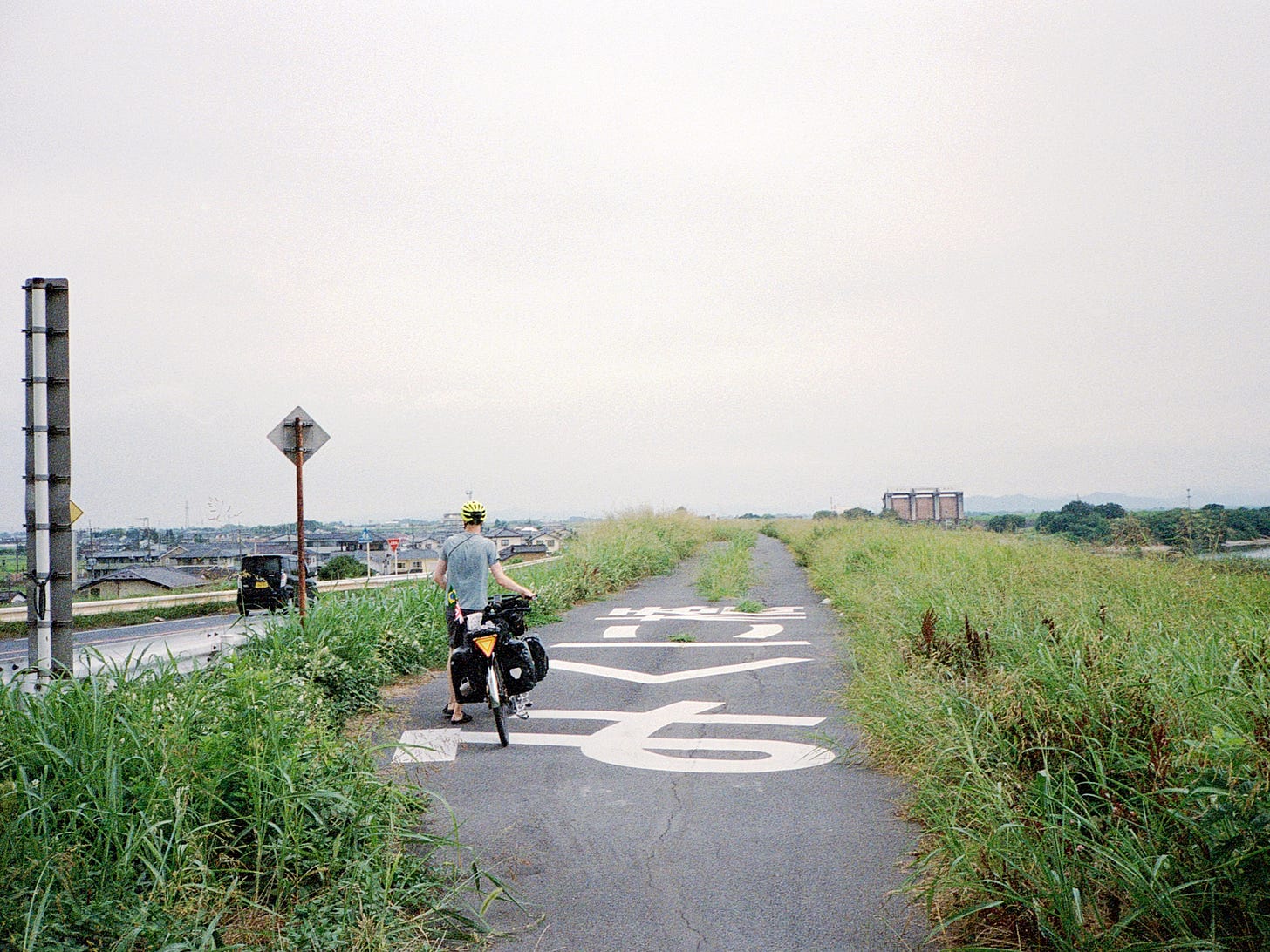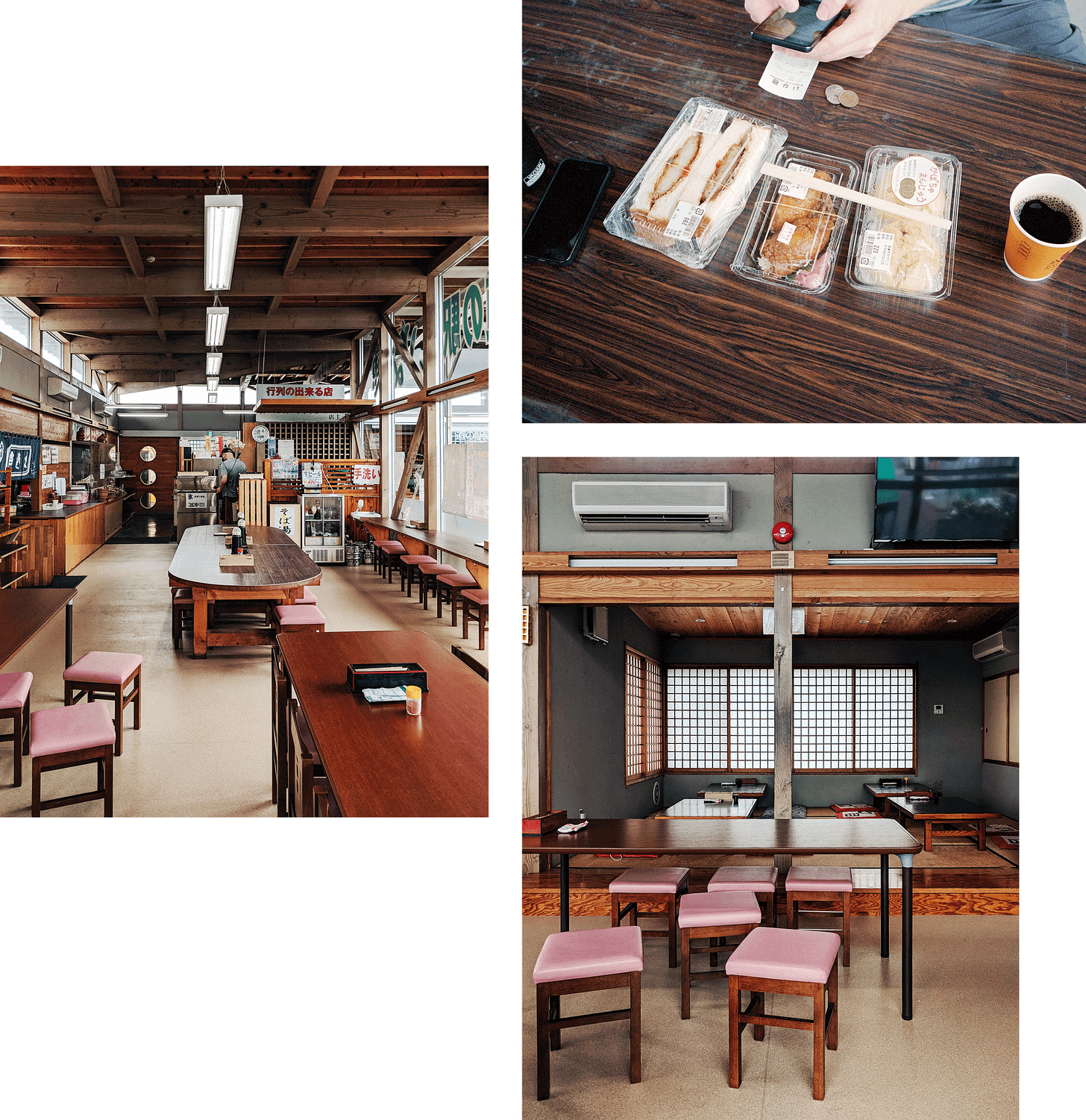26th July, Satte to Kiryu
A good start to the day: rice, miso soup, pickled vegetables and natto, a very slimy, stringy, stinky brown blob of fermented soybeans — the very definition of an acquired taste for someone who, like me, kept the taste buds of a toddler far into their twenties. I did acquire it, even if involuntarily.
On a previous visit, I’d gone alone to a traditional pub in Kanazawa. The only foreigner in the place, I’d been given a place at the bar, where I sat swaying between self-consciousness and excited anticipation at all the deliciousness ahead.
I’d used a risky combination of Google Translate and finger-pointing to order, then settled into a state of awe at the man behind the bar. With thick, slicked-back hair, he towered over the place and worked with military precision, checking every single dish as it came out of the kitchen, sending things right back in, and intercepting waiters about to deliver the wrong food to the wrong people. While the general staff all wore white shirts over white t-shirts, this man wore a yukata over nothing, his chest bare and the sleeves of this more casual kimono held up by a long strap crossed behind his back.
I was a little puzzled when what looked like a giant sandwich was put in front of me, though I didn’t dare say anything — given my ordering method and yukata-man’s precision, the mistake could only have been mine. I took a bite and, before my teeth could even finish their job, the rest of my mouth went into full revolt. Inside the giant sandwich was a mountain of natto and now its slime coated all of my mouth’s surfaces.
Well, this was awkward. I surely didn’t want to eat this or any other mountain of natto, ever. I’d tried it years before and my reaction had been unequivocal: no, thank you. Yet the man behind the bar exuded such an air — awe-inspiring, yes, but also fear-inducing — that all I could bring myself to do was plough through, not wanting to embarrass myself. However long it took me to finish, it was enough for either the taste to shift or my taste buds to acclimate. By the end I was shockingly into it — I still am. But I am particularly into the “ooohhs” and “aaaahhs” of approval I get from the Japanese whenever I order it.
This country brings out the worst of the teacher’s pet in me. Perhaps because there are so many unspoken rules, such specificity in the way they act and interact, so many little rituals a foreigner not only doesn’t understand but often doesn’t even notice. The Japanese are mostly gracious about our blunders, but I still try to be aware and learn and show that I’m making an effort. I love the place so much that I, irrationally, want it to love me back.
The ride was similar to the day before: grey sky, sore bum, pretty toilets, a bit of suburbia, a bit of industry and a flat cycle lane following the Watarase River, but with mountains ever closer and more present.
And! With our first Michi-no-Eki (and here feel free to imagine an overly saturated image of sparkly rainbows to a “pliiiiim” promised-land-type soundtrack). Michis, as we took to calling them, are yet another reason to love Japan, and were to become a daily fixture in our travels there.
The name translates to roadside station, but they are nothing like the ones we’re used to in Europe — where toilets are paid and people shit all over the hidden and not-so-hidden corners of any grassy patch, exactly where our dog also likes to take one of his photogenic dumps. To begin with, they don’t sell fuel, and instead of the generally bad food, it’s mostly a hyper localised selection of goods. A wonderland of snacks old and new to me.
Each michi is like a little capsule of the surrounding area’s produce, food, and culture, each with its individual look and feel. And they live up to their mission as a refuge for travellers. There’s no pressure to buy anything, people are welcome to just sit on a table, charge their stuff, use the free wifi or the spotless toilets. These are also free, sometimes include showers and, while the shop and restaurant usually close around 6 or 7 pm, the toilets stay open 24hrs.
Travellers of all kinds, including many families, park their cars, vans or motorbikes and spend the night. We’d been told by other cyclists that michis are also great places to pitch a tent, as long as you do it after closing and leave before opening times.
This first one we came across had a canteen-meets-traditional-Japanese look, with a big restaurant, a corner in tatami and shoji windows, and a little garden centre outside. We had a second breakfast of inari sushi and pumpkin bun for me and some katsu sandwich for Hugo (if there are any Japanese reading this, apologies in advance for all the murderous ways in which we’ll end up combining your incredible food).
We’d decided to sleep in the town of Kiryu, for no particular reason other than it seemed like an OK distance to ride in a day, on our way to the mountains. Without a michi nearby, we scouted the train station and the town square, two other places cyclists considered safe and generally acceptable (if not necessarily legal) to camp at, as long as you followed the same rules: pitch after dark, leave before dawn.
The station was adorably small and pinkish and also closed entirely for the night and the square felt a bit too advanced for us to pull off on our first attempt. Then we stumbled on a discreet spot on a flat, grassy field at the edge of town. There was even a fully functioning water tap next to it. Perfect!
Shelter sorted, we went in search of food, but watched as the town closed for the evening, while still trying to find a cheap restaurant with vegetarian options for dinner. We ended up at Don Quijote, the famous chain of multi-floor discount stores, one of those places I usually enter excitedly, with a sense of fun and fascination, but invariably leave drained and overwhelmed by the music, the door jingle, the sounds — always so many sounds. It’s visually overwhelming too, with row upon row of stuff, or signs advertising the stuff.
I normally enjoy how staff in Japan play around with the many welcoming “irasshaimase” they shout as each customer comes in (I once heard a guy go “irasshaimaseeee, iiiiiiiiiirasshaimaseeee, ira-ira-iiiiirasshaimaseeee”). But after thirty times, it loses its appeal. It is the polar opposite of a michi. On this night though, we were grateful for the big, late-closing chain — us, and apparently the town’s entire elderly population.
We found the floor with the hot and cold food counters, ate and charged our stuff, between groups of chatty old people and the bust of a zombie about to glug down a reduced-price bottle of champagne.
As the relief of food, chair, and a/c wore off and the real fatigue of the day settled, time unpleasantly dilated. I could almost feel the friction, the grind of minutes trying to pass, but dragging as if against a rough surface. My body begged me to lie down, to allow my eyes to close, but it was too early, all the oldsters around us would still be walking the streets on their way home for a while.
One of the many stories repeated to me throughout my life (often offered as a sort of proof that my grumpiness is nothing new) is that, as kids, my brother and I soured pretty quickly when out after dark. “We’re tired, take us home, we wanna go to bed”. Only to perk up, in blissful content, sometimes in bursts of energy, before the door even closed behind us. I remember the feeling well.
As I got older, I’m not sure if the feeling itself changed or if I now just have more words to describe it: a disconcerting, deep sadness and a primal need for comfort and shelter as day gives in to night. This doesn’t happen every evening, of course, these days mainly if I’m out in nature or on nights such as this. And it may sound odd but, if I’m feeling generally safe, every now and then I like to surrender to it. I see it in the distance, faint at first, but rolling in, like fog, or sandstorm, and instead of running, I allow it to engulf me.
Think of it like going on a rollercoaster, your heart pounds, your stomach churns, you may even throw up, but your body is safely strapped to the chair. It’s a shortcut to an emotion without any real risk. On this night though, I saw it coming, I felt the discomfort, I thought of the time we still had to kill, then of pitching a tent in the dark.
It wasn’t gonna happen. Hugo agreed. We felt both relieved and a bit defeated. After all, one of the points of this trip was to overcome exactly that sort of stuff, to pit ourselves against our discomforts. But not tonight.
After a couple of attempts (fully booked, too expensive), we landed at Toyoko Inn, another place we’d come to cherish, this cheap chain with its identical room layout countrywide. The same peach curtains, the same glass and metal bedside table and lamps and plastic bathrooms, with their retractable clothesline above the bath.
In the first winter of the pandemic, Hugo and I sat on a curb in Intra, a small town in Northern Italy, to drink our caffè d'orzo on a perfect January morning of crisp air and warming sun. This “espresso”, made with ground barley rather than coffee, was new to us, as were this town and this little routine we'd made for ourselves. Every morning we hit a different bar to try their version of caffè d'orzo. We talked about how lucky we felt to always find new things to love, wherever we were. Things that, even if temporary, helped us feel more grounded (not unlike the contents of my backpack), and would go on to become part of us. Hugo called it “enlarging our vocabulary of affections”.
Tonight we failed to enlarge our comfort zone, but we ended the day with two more items in our little inventory of loves. Michi and Toyoko now sit right next to natto in the Japanese section.
Tonight we would wash our dusty clothes in a sink, sleep on a bed, under a duvet, in a room, in a building, with multiple layers between us and the disquiet of the quiet night. Tomorrow maybe, we could try again.











I grabbed a blanket, headed to the garden with a delicious slice of gâteau aux trois chocolats, and read this under the sun. Pfff! Feeling suuuuper privileged!
Thank you so much for sharing Carol... It’s so beautiful to read you! ❤️❤️❤️
Lovely reading, thank you Carol!